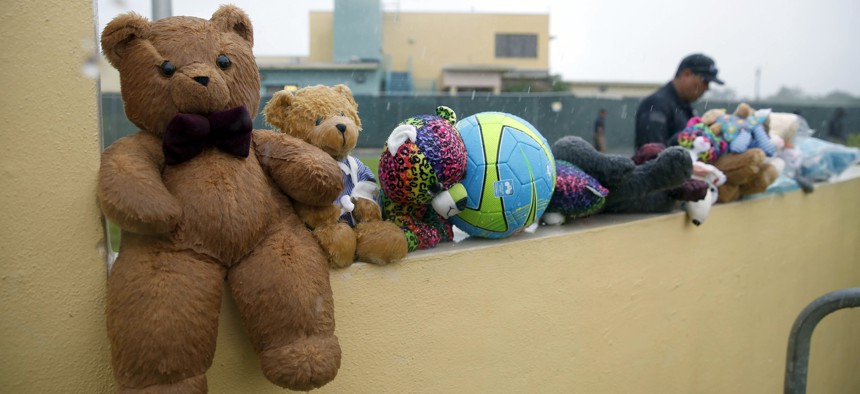Supreme Court to Hear Dispute Over Same-Sex Foster Parents

In this Saturday, June 23, 2018 photo, a guard walks by toys protesters left for migrant children in Homestead, Fla. Foster care advocates say some children will end up in the American foster care system. AP Photo/Brynn Anderson

Connecting state and local government leaders
Catholic Social Services is fighting Philadelphia’s decision to stop working with the foster agency because it will not place children with same-sex couples.
The U.S. Supreme Court agreed Monday to hear a religious rights dispute that has implications for foster care agencies across the country that refuse to work with same-sex parents.
The case stems from the city of Philadelphia’s decision to stop contracting with a Catholic foster care agency because it does not place children with same-sex couples.
Catholic Social Services, one of 30 foster care agencies that had worked with the city to place children in foster homes, said Philadelphia’s decision violates its First Amendment right to freedom of speech and religion.
CSS, an arm of the Archdiocese of Philadelphia, wrote in a petition filed with the court that since it opened in 1917 no same-sex couples have ever approached the agency about becoming foster parents and therefore it has never turned anyone away. The agency said it was only after a 2018 newspaper article highlighted the agency’s policy of not working with same-sex parents that Philadelphia officials told the agency that unless leadership reversed this stance that its contract would not be renewed and it could no longer help connect children to foster care.
Philadelphia wrote in its response that the CSS policy violated the city’s Fair Practices Ordinance, which prohibits discrimination based on race and sexual orientation. Once the city learned about the policy, the city’s Department of Human Services decided to suspend any new placements to the agency.
More than 6,000 children are in Philadelphia’s foster care system. Across the country, the opioid epidemic has contributed to an increased number of children being placed in foster care systems.
A federal judge and the U.S. Third Circuit Court of Appeals both sided with Philadelphia. The Third Circuit found that Philadelphia’s ordinance “is a neutral, generally applicable law, and the religious views of CSS do not entitle it to an exception from that policy.”
In a brief supporting the city, the ACLU of Pennsylvania argued that allowing an agency to discriminate against same-sex couples could deter prospective foster parents from the system, even if there are other nonprofit organizations that would work with them.
“Allowing foster care agencies to exclude same-sex couples—or any other class of potentially qualified foster families—undermines the best interest of children by shrinking the available pool of families and thereby limiting children’s opportunities to be placed with a family that can meet their needs,” the group wrote.
Eleven states allow state-licensed child welfare agencies to refuse to place children with same-sex couples, if doing so conflicts with their religious beliefs, according to the Movement Advancement Project, a gay rights group. In one of those states, Michigan Attorney General Dana Nessel, a Democrat, last year moved to end that policy as part of a legal settlement with the ACLU in that state. However, a federal judge subsequently blocked the policy shift, finding that a Catholic foster care agency’s objections to placing children with same-sex couples was not discriminatory.
Ten states with Republican AGs asked the high court to take up the Philadelphia case, arguing that states often come under attack when they contract with private entities to facilitate foster placement.
“On the one hand, when a state contracts with a group whose faith limits its ability to place children in certain home environments, the state is sued by groups advocating for LGBTQ interests and separation of church and state,” wrote the group of states in an amicus brief. “On the other, when a state precludes faith-based organizations from contracting with the governmental entities unless they violate their religious beliefs, then the state subjects itself to suits by advocates for religious freedom.”
The states that signed onto the brief are Alabama, Arkansas, Kentucky, Louisiana, Missouri, Nebraska, Ohio, Oklahoma, Texas, and West Virginia.
Three foster parents joined CSS in the lawsuit. One of those foster parents, former social worker Toni Simms-Busch, said it was important for her to work with an agency “that shares my core beliefs and cares for my children accordingly.”
Faith-based agencies play an important role in finding homes for foster children, said Lori Windham, senior counsel at Becket, a non-profit, public-interest law firm representing CSS.
“We are confident that the court will realize that the best solution is the one that has worked in Philadelphia for a century—all hands on deck for foster kids,” Windham said.
Andrea Noble is a staff correspondent with Route Fifty.

NEXT STORY: As Suicide Rates Climb, Crisis Centers Expand




